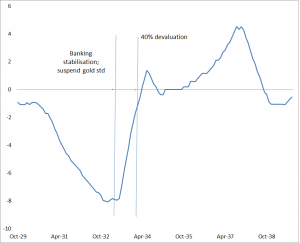Pushing back against the “Can’t solve debt with more debt!” argument
1. Reject the premise — that our problem is “too much debt”.
Our problem is not too much debt but too little! We are amidst a de-leveraging recession, a rare situation in which the private sector on a net basis is trying to improve its financial position. This might sound OK on an individual level but it’s a nightmare in aggregate. This is in fact why JM Keynes *invented* macroeconomics. He called it the “paradox of thrift”. One person’s (or firm’s or government’s) spending is another person’s (or firm’s or government’s) income. If you’re not spending, then I’m not earning. The vast majority of the money we would spend — if we wanted to spend it — is created through new lending by the financial system. But we’re doing the opposite right now: we’re trying on a net basis to pay down our debts. What this means is a shrinking in the money supply. So, reject the argument that the problem is “too much debt”. The problem is rather “too little debt.”
2. Compare the government not with a household but with a firm.
The market is offering you an interest rate of 3.27% on a 30-year term. Do you mean to say there are absolutely no projects which won’t pay better than a 3.27% rate of return? Honestly? For the government it’s especially straightforward — you don’t even need to “capture” those returns directly (as a firm would), you just need for those investments to enhance the economy’s (nominal) growth rate. Surely pouring money into educational infrastructure and people would pay a huge dividend for the economy’s growth, and this higher growth would come back to the government in the form of high tax revenues.
3. Analogously: You don’t have to balance your budget!
(And if you did seek to balance it, in effect you’re saying “Sorry, we just don’t see that there’s anything we can do that would make the economy work better.”) You just need to be sure that you can stabilize the ratio of debt to the economy in the medium term. Hell, you can even *grow* the amount of debt so long as the economy itself is growing! I’ll go one step further: you can grow the amount of debt outstanding even faster than you grow the economy! This is because, when the private sector comes back to life, you then do the opposite — grow debt slower than you grow the economy, because you know the private sector is doing the needed spending.
